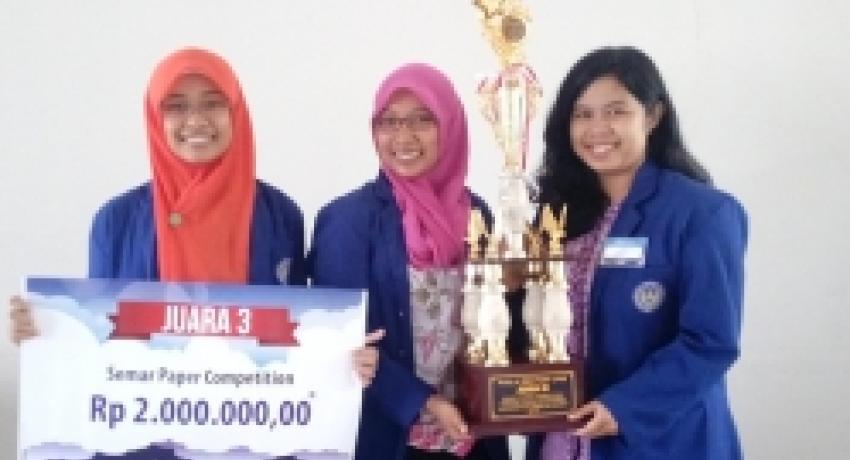Three students of Chemistry Education, Faculty of Mathematics and Natural Science (FMNS) namely Shinta Pramudyasiwi, Asti Dian Arini and Fitri Handayani were announced the 2nd runner up for National Scientific Writing Competition, as part of Student Scientific Festival (Festival Ilmiah Mahasiswa/FILM) 2016 held by Student Scientific Study, Sebelas Maret University, from 4 to 6 March, 2016. The title of their work is “Kang Semar” Inovasi Kantong Semai Berbahan Dasar limbah Jerami sebagai Pengganti Polybag untuk Mewujudakan Pertanian Ramah Lingkungan menyongsong Indonesia Emas 2045 (“Kang Semar”, Innovation on Straw-based Seed Bag as Substitution of Polybag for Friendly Farming in the Face of Golden Indonesia 2045).
Fitri explained, the use of polybag in the process of seeding has several constraints, namely the need to tear / make holes on the polybag when transplanting, that is considered impractical for farmers. Polybag is also made of plastic, uneasy to degrade by microbes. It soon will impact the growth of the plants. Plastic is also considered harmful and contaminating for land. Moreover, tearing the polybag could also impair the growing medium and the roots, leading to stagnation in the seeds.
One way to overcome the weaknesses of polybag is shifting to the use of organic, environmentally friendly material-based polybag. In this case, Fitri proposed the use of straws, as straws are considered the most abundant farming by-products that have not yet managed optimally. Based on the background, the writer proposed an innovation entitled Kang Semar, an eco-friendly seeding bag made of straws and jumbay (Leucaena leucocephala) leaves, starch, and dung. This innovation is expected to overcome the abundant stacks of polybag waste, while making use of waste and creating an environmentally friendly seeding bag rich in nutrients.
The making of the product requires two stages: pulping and pressing. In the pulping, straws, jumbay leaves, and NaOH were weighed, accounting for 200 gram, 100 gram, and 20 gram respectively. The straws and NaoH were put into a cattle of 2,5 liters of water, and then cooked and stirred in 1000 degree Celsius temperature. It took 15 minutes to cook. The straws and NaOH were added with jumbay leaves, grinded until becoming a dough. The dough was added 50 grams of starch and stirred. Lastly, the dough was ready to go to the pressing stage.
“The advantages of Kang Semar are being environmentally friendly, practical, sustainable, and rationally priced” Fitri added. (fitri/witono)





